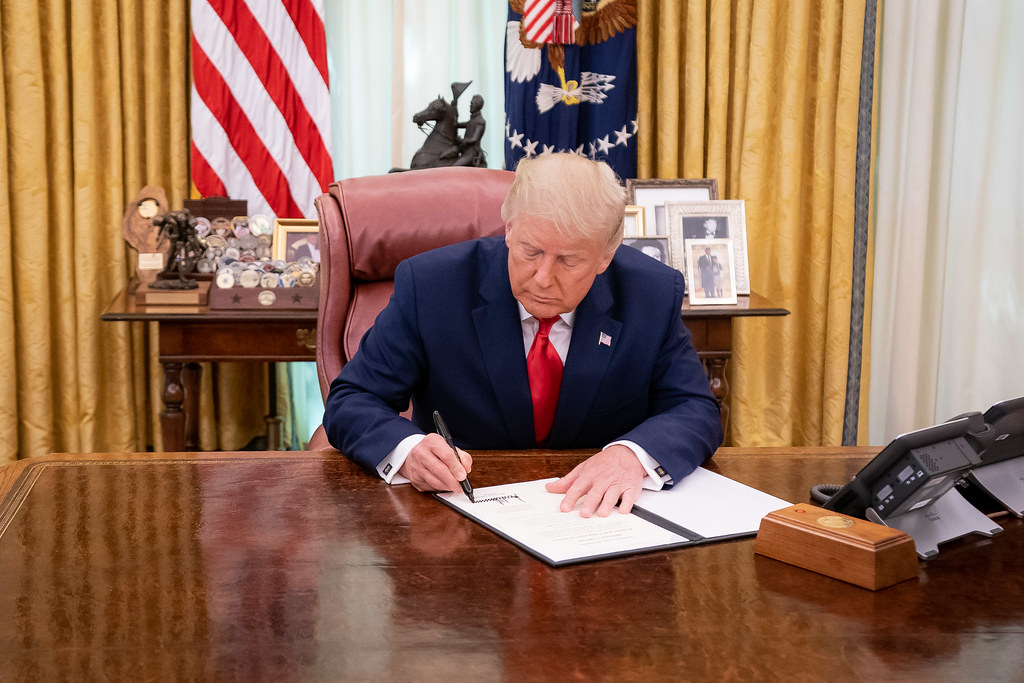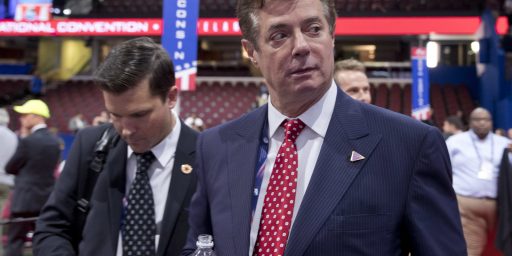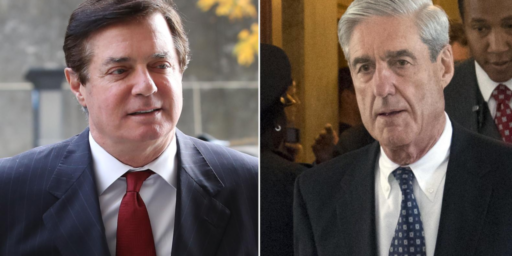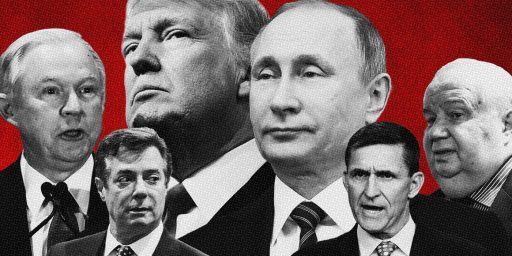Trump Pardons More Cronies
Roger Stone, Paul Manafort, and Charles Kushner are among last night's lucky recipients.

CNN (“Trump issues 26 new pardons, including for Stone, Manafort and Charles Kushner“):
President Donald Trump on Wednesday evening announced 26 new pardons, including for longtime ally Roger Stone, former campaign chairman Paul Manafort and White House senior adviser Jared Kushner’s father, Charles.
The pardons extend Trump’s streak of wielding his clemency powers for criminals who are loyalists, well-connected or adjacent to his family. While all presidents issue controversial pardons at the end of their terms, Trump appears to be moving at a faster pace than his predecessors, demonstrating little inhibition at rewarding his friends and allies using one of the most unrestricted powers of his office.
The pardons of Manafort and Stone reward two of the most high-profile and widely condemned former advisers of the President, both of whom were indicted by special counsel Robert Mueller, went to trial and were convicted by juries of multiple crimes.
Manafort, who is serving home confinement, admitted his crimes and initially agreed to cooperate with Mueller then lied to prosecutors, while Stone never cooperated after lying to Congress to protect the President. Manafort spent close to two years in prison for bank and tax fraud, illegal foreign lobbying and witness tampering conspiracies before being released because of the Covid-19 pandemic, while Stone’s sentence for obstruction of Congress and threatening a witness was commuted by Trump earlier this year days before he was set to surrender.
We all expected the pardons of his cronies. Frankly, it’s not even unusual for normal Presidents.
This one is particularly disgusting:
Charles Kushner, meanwhile, had been prosecuted by then-US Attorney for New Jersey Chris Christie in the early 2000s for tax evasion, witness tampering and illegal campaign contributions.
He eventually pleaded guilty to 16 counts of tax evasion, one count of retaliating against a federal witness — his brother-in-law — and another count of lying to the Federal Election Commission.
Christie in early 2019 went on to say that Charles Kushner committed “one of the most loathsome, disgusting crimes” he had prosecuted, referring to an elaborate revenge plot that the older Kushner hatched in 2003 in order to target his brother-in-law, William Schulder, a former employee turned witness for federal prosecutors in their case against Kushner.
As a part of the plot, Kushner hired a prostitute to lure Schulder into having sex in a Bridgewater, New Jersey, motel room as a hidden camera rolled.
A tape of the encounter was then sent to Kushner’s sister and Schulder’s wife, Esther. Ultimately, the intimidation stunt failed. The Schulders brought the video to prosecutors, who tracked down the woman and threatened her with arrest. She promptly turned on Kushner.
What a despicable human being.
I’m not even sure what to make of this one:
Also included in Trump’s pardon list Wednesday evening is former California GOP Rep. Duncan Hunter’s wife, Margaret, just one day after Trump granted Duncan Hunter a full pardon. Margaret Hunter had pleaded guilty last year to conspiring “knowingly and willingly” to convert campaign funds for personal use.
Was the one-day delay intentional? Or just an oversight.
Regardless, while pardoning political allies is hardly novel—it’s a bipartisan tradition—Trump is unusual in that he has used the power almost exclusively in that manner:
Of the 65 pardons and commutations that Mr. Trump had granted before Wednesday, 60 have gone to petitioners who had a personal tie to Mr. Trump or who helped his political aims, according to a tabulation by the Harvard Law School professor Jack Goldsmith. Although similar figures do not exist for previous presidents, legal experts say that those presidents granted a far lower percentage to those who could help them personally and politically.
Mr. Trump’s use of his powers to grant clemency to allies and supporters drew criticism even from some Republicans. “This is rotten to the core,” said Senator Ben Sasse, Republican of Nebraska.





When Mr. Trump inevitably pardons himself and his immediate family, there is speculation that the fact of these pardons of cronies and associates will be strong evidence to be used in the court challenge of such a pardon.
Trump operates at the margins of legality, ethics are simply irrelevant, and his behavior will be studied in law schools for years.
Make no mistake: the pardons of Stone and Manafort were given in exchange for their lack of candor and refusal to cooperate with Federal authorities.
If Congress can investigate Bill Clinton’s pardon of Marc Rich, it certainly must investigate these.
Can Congress, and I mean the House Democrats, conduct an investigation on the 2016 election, and require testimony from Stone, Manafort, and other such vermin? They can’t allege self-incrimination, because of the pardons.
If so, wither we learn exactly what went down, or these people end up in prison for contempt of Congress.
@Mikey: It’s not obvious to me what the remedy would be. They don’t have time to impeach him again and I don’t think he can be held criminally liable for his official actions as President.
Part of Manafort’s plea bargain was the forfeiture of $10 million plus in property, cash, and a life insurance policy. The government will now have to cut him a check for the amount. Source
@James Joyner: Politicians can be and are prosecuted for corrupt official acts. It’s not clear to me why Trump couldn’t be prosecuted for obstruction of justice after he leaves office, given the clear record of him floating pardons to Manafort and Stone and the obvious connection to their lack of cooperation with the Mueller investigation.
@Tony W:
Law schools should develop and require courses based on Trump’s behavior. His ability to weasel and squirm out of things should at least be learned from–to determine how to prevent this nonsense going forward. Every time I manage to calm myself thinking he’s almost gone I realize that malevolent and much smarter politicians are learning from this debacle.
@Kathy:
Congress can investigate and anyone who has accepted a pardon loses their 5th amendment rights, so they would be forced to testify. If they lied under oath or refused to testify, they could be prosecuted for those actions.
@Jen: Lawyers who are not legislators have no ability or incentive to reform the system. Law professors should study Trump’s actions and offer advice to the appropriate people on how to plug the holes, but there’s no guarantee any of the appropriate people will care. Or have time available for anything but damage control. But if the Law schools offer courses, lawyers will learn how to improve on Trump’s tactics.
@Sleeping Dog:
There comes a point when one can regret the Democratic Party is more interested in policy and legislation than they are on payback, no?
@sam:
Not necessarily 😀